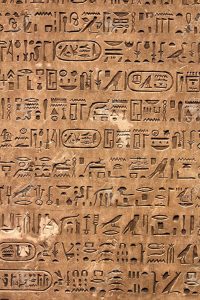Archive, Articles
Teach Yourself Egyptian
This piece was published in The Tablet in the issue dated 7 October 2023.
In an interview given on 27 May, Jean-Claude Cardinal Hollerich, ever unafraid to say the unexpected, remarked: if we try to speak to people of our time about chastity we are likely to seem to be ‘speaking Egyptian to them’. The statement impressed me. I had just sent my London publisher a manuscript entitled Chastity. Had I in effect written a manual of Egyptian?
In a way, yes. I contend that we have lost the vocabulary, grammar, and syntax required to speak intelligibly about chastity, and have thereby lost sight of a crucial dimension of human flourishing.
I quite see that this may appear provocative. ‘Chastity’ has become a word for antiquarians. It describes a set of attitudes and a code of behaviour associated with a past age. Many rejoice to see it bygone. Hearing the word spoken today, we are more likely to think of thwarted sexuality than of dew-besprinkled strength of virtue ‘fresh as Dian’s visage’, to cite Othello.
The unravelling of sexual abuse committed by people, overwhelmingly men, who had professed a vow of chaste celibacy has rightly occasioned a surge of rage throughout society. The ideal of chastity appears discredited, certainly as a mandatory form of religious observance. Revealed to have been, often, not just lifeless but deadly, it is present to us now rather as a decomposing corpse awaiting burial. There is grief clinging to it, yes; but is there any reason to mourn its passing? 
I think there is. So I undertook to look into what is at stake. My book is neither a defensive apology for chastity nor the chronicle of the demise of a human habitus. It is an attempt to decode a partially lost language, to rediscover its poetry.
What is the definition of ‘chastity’? A great many people, including some who should really know better, assume that ‘chastity’ is tantamount to ‘celibacy’ and that talk about chastity is little but a sophisticated code by which mitred prelates tell hoi polloi from the pulpit, looking down, ‘Sorry, folks, you just can’t do it.’
The reduction is absurd. To tie chastity down to erotic abstinence, to mere mortification of the senses is to make of it potentially a tool to sabotage the flourishing of character. It is also to misunderstand, misrepresent and misapply the meaning of a complex notion.
The word ‘chaste’ reached English through the Romance languages from the Latin castus, used by classical authors to translate the Greek katharos, meaning ‘pure’. From katharos we get catharsis, a word central to the Poetics of Aristotle. This reference is not as highfalutin as it might seem. It has structured our very understanding of experience, whether or not we read much Greek philosophy.
Aristotle uses catharsis as an image for the inward cleansing that may come about in one who goes to see a tragic play. Observing the rendering on stage of strong, normally hidden emotion, invested in the drama by an empathy at once intellectual and visceral, the viewer may tap these same depths in him or herself.
Let’s consider an example. Say we settle down in front of the TV to watch Ingmar Bergman’s film Autumn Sonata from 1978. A mother and daughter meet for a choreographed reunion intended to reassure both of duly performed filial/maternal duties so that they can tranquilly take another good long break from one another. The choreography breaks down. After an evening of lame exchanges haunted by the unsaid, the two meet in the kitchen at midnight: unable to sleep, both had gravitated towards the kettle. There, in their nighties, divested of composed exteriors, they start calling things by their names. Eva, the daughter, reclaims her voice after a lifetime’s submission to maternal tyranny dressed up as care. Her mother (Ingrid Bergman acting magnificently in her last role), owns an insecurity no one had suspected.
The drama is not easy to watch. We may find it hard in our turn to go to sleep afterwards, finding that our thoughts spin, our stomach churns, anguish surfaces — and that, says Aristotle, is how catharsis can happen. In so far as I identify, tap, and name wounds I carry, raw nerves touched by the performance I have seen, I might permit what, in the depths of self, had been implicit or suppressed to find outward form, with an inward sigh of relief. It is a matter of overcoming inward fragmentation, to find wholeness, and thereby freedom.
This kind of purity is reached by passing through the mess, owning it.
This is the register of experience for which Latin authors adopted the terminology of chastity. Lewis and Short, in their Latin Dictionary, explain that the adjective castus in Antiquity was synonymous with integer. The term was generally used ‘in respect to the person himself ’, not so much ‘in respect to others’. Chastity, in other words, was a marker of integrity, of a personality whose parts are assembled in harmonious completeness.
Now, who wouldn’t want a bit more of that for him or herself, or for the societies in which we move?
Setting out from the aspiration to wholeness — Biblically expressed in God’s call to Abraham: ‘Walk before me and be entire’ (hyeh tamim, Genesis 17.1) — I attempt to evidence the dynamics of ‘chastity’ in relational and sexual life, discourse about which has formed the term’s main habitat since the Middle Ages. I consider the challenge of maturing to chastity through the prism of multiple tensions. Few find their way to integrity without a sense of being pulled in different directions. The experience may recur at different times of life in different ways. There can be joy in it. There can also be a sense of agonising conflict.
How do we deal with the fact of being at once matter and spirit, two experiential dimensions requiring different kinds of nourishment and direction? How do we position ourselves within the complementarity of male and female? Can a possibly unified path be found between the yearning to be free and the call to ascesis, that is, the conscious education of our passionate lives?
These are some of the questions I consider. I try along the way to clarify a few key notions that have become rather opaque. What does it mean, for example, to speak of ‘nature’ and to define what is and is not ‘natural? How do we understand the Church’s sometimes perplexing statements about ‘order’ and ‘disorder’?
Anyone touching such issues even with a very long stick nowadays sets himself up to be pelted with eggs. Well, that’s the way it is. I hope nonetheless I may help to clarify the vocabulary we need to speak responsibly of an area in which we are vulnerable. A rhetoric merely of sentiment won’t do. We need pondered, careful, prayerful thought rooted in the Word of God, which alone can explain ourselves to ourselves. The Word incarnate is the sole key even to exercises in Egyptian.
A longing for the life-giving Logos is implicit in much contemporary sexual confusion, even when it finds expression in terms that seem to have gone off the rails. In a post-secular world, the claims of the soul are as evident as ever they were, for being often expressed negatively, a function of pain, and bodily. Moderns are loath to speak of God, yet readily admit to feeling trapped in creaturely limitation. While giving no explicit credence to doctrines of the afterlife, they are consumed with a yearning for more. While determined to assume their incarnate humanity, they vaguely know that our body points beyond itself, since every apparent satisfaction is but achingly provisional.
As Christians we have words today’s men and women need to understand themselves at this level. We have no right not to share them.
My book is a pontifical effort. To be a pontifex is to build bridges. Given the amnesia to which the West has succumbed regarding its Christian patrimony, a chasm extends between ‘secular’ society and the Church’s shore. When attempts are made to holler across, we risk misunderstanding: even when the same words are used on either side, they may have acquired different meanings. Bridges are needed to enable encounter. Christians must present their faith integrally, without temporising compromise; at the same time, they must express it in ways comprehensible to those ill-informed about formal dogma.
They will often do this most effectively by appealing to universal experience, then trying to read such experience in the light of revelation, weighing their words.
That is how the Fathers preached. That is why their proclamation rings still with such engaging clarity. We must learn to speak likewise, grateful for riches passed down from of old and respectful, at the same time, of our own strange times. No life-giving word was ever uttered with scorn.
The language with which we proclaim the mystery of faith as it touches the depth of our humanity, our flesh, must be balanced and purified, freed of self-righteousness, anger, and fear — that is, it must itself become chaste.
